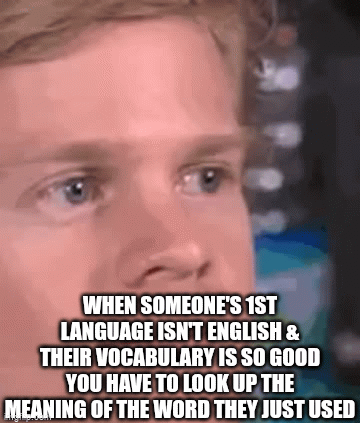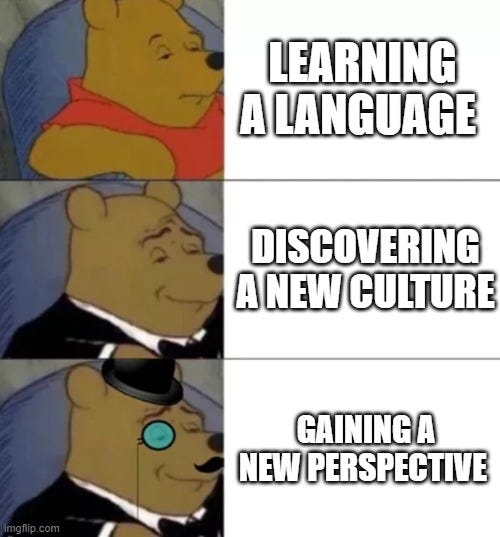Learning a New Language Can Teach You About Yourself
How unique vocabulary words craft self image
Welcome, aspiring polyglot! This week in conjunction with
we will be exploring the idea of emotional concepts and ways you can take advantage of your individual personality. Sim writes extensively about the interconnection between biology and philosophy, which is the grounds for his coaching service. If you interested in working with him individually you can reach out to him on Twitter or through his Substack linked above.The goal of this series will be to deepen your understanding of yourself, particularly with how your language learning personality can help and/or hinder you. We will also be touching on some really interesting vocabulary words in other languages that may help you express feelings you know well but have never been able to verbalize.
Learning a new language is powerful for many reasons, but few understand how much it can help in understanding oneself on a deeper level. Through these words and the continued exploration of the concepts we hope to illuminate this for you.
What is an emotional concept?
An emotional concept is essentially the understanding of an emotion and the many different feelings attached/associated with it. Emotional granularity is your ability to differentiate the emotion into many more feelings. Emotions are not cut and dry, we get that much.
For many people, learning a new language is excruciatingly frustrating at the start. The inability to express oneself adequately is extremely unpleasant and no matter how adept you are with languages, it is something you are going to face when getting started. Learning to express this emotion, and all of the emotions you are feeling throughout your experience, is difficult. Nevertheless, self expression is absolutely necessary.
Why is it important
The primary reason you need to learn to express yourself as precisely as possible is because when you don't recognize or understand an emotion it tends to be acted out. There is a neurological element here primarily comprised as categorization, when you don't know what you are feeling, your psyche will go into overdrive trying to figure out what this emotion/feeling is and what to do with it.
In small children this is expressed often in tears and tantrums, but that is not exactly something you can do as an adult learning a new language. Our theory is that your ability to express yourself verbally is integral to your psychological development. Having a limited vocabulary is often reflective of a limited world view and that problem can carry over into your psychology even if you do not recognize it.
Let's take a little detour through developmental psychology with the help of Sim.
Where it all begins
2-year-olds start being able to recognize emotional states and also start being able to categorize them. They understand emotions in OTHERS FIRST. Before they develop the capacity to do this for themselves. Now Imagine if you lack the vocabulary to tell your child what you are feeling, how are they supposed to learn emotional granularity?
Name it to tame it.
Daniel Siegel, the developmental psychologist, calls this. To be clear, this doesn't mean the emotion/feeling disappears. It can diminish in intensity, but the important thing is that it allows the child/person in question to know what they are feeling and what they can do to deal with it. Naming matters for both parties because of: recognition, categorization, and validation to feel acceptance of the emotion
An important Side note: emotional categorization and regulation tend to be difficult for people with traumatic backgrounds because they tend to have not been emotionally educated by their parents, and due to the damage done to their self-regulatory circuits (which can be healed/sorted).
One of the major hurdles and challenges everyone faces when learning a new language is the inability to express depth of feelings/emotions. To add complexity and challenge on top of this, recognizing these emotions and feelings in others in another culture is also based on understanding the emotional concepts (which are socio-cultural).
Hence "lost in translation", a lot does get lost in translation when we miss the emotional concepts and categories other cultures use, which are baked into the language and the body language (paging
). Both of which are completely embodied. If you are interested in ways you can use body language to enhance your second language abilities be sure to check out this article:Enhancing Language Skills with Non-Verbal Communication
Welcome, aspiring polyglot! As I have mentioned before, body language is a powerful tool you have at your disposal when learning a second language. If you can understand the tone and emotion behind words, through body language cues, you can limit the pool of words you have to guess from when conversing. The better you get at this, the easier it will be.
We all know that practice is important for any skill, but what is often neglected is the fact that recognizing and categorizing emotional concepts is also a skill. That's also why immersion is important, as paying attention to the context in which these emotional concepts take place.
The emotional granularity wheel can become a whole lot more nuanced or complex based on the language and the culture. And even within the same society different cultural and geographical emotional concepts can be used or are dominant.
So if we plug in the developmental psychology here: it’s by learning about these emotional concepts in and through others, that we eventually get access to them as well. Which makes our emotional experiences far richer.
Remember, what you know and how you express yourself in your native language may be holding you back from fulling understanding how you feel and who you are. Adding a new language to your repertoire can offer you a deeper understanding not only of others and the world around you, but of yourself as well.
Conclusion
Over the next several months, Sim and I will be bringing you tools that you can use to amplify your life by understanding your biology, your psychology, your neurology, and how they all work together to make you who you are. This is an approach he has used successfully to work with C-suite individuals to enhance their lives. It just so happens that my approach to language learning is extremely similar and our strategies work symbiotically.
While we will be bringing lots of free content to you all, if you are interested in working individually with Sim to enhance your life, you can reach him on Twitter or directly via Substack.
Creating is more difficult than consuming. This is a universal truth and nothing above is going to be easy, irrespective of how simple the task is. If you can push yourself to the point where you are creating at least a quarter of the time you are studying, you will be shocked at how quickly you progress. It will be difficult, but you can do difficult things and be great. So go do some difficult things and become great; and remember to record your stories for posterity's sake.
Eager for more Second Language Strategies?
Be sure to check out Second Language Strategies to catch up on anything you missed, find me on Twitter, TikTok, or Instagram for some short form content. Don't forget to check out the new stuff we are creating over on YouTube! I look forward to seeing everyone’s progress in the months and years to come.










Great post! Another thing you learn about yourself when learning another language is whether you give up on a pursuit when it's difficult. It's counter-intuitive, but often it's overachieving type A people who will give up early on a pursuit if they don't think they're naturally good at it. This is because they cannot stand to be crap at something.